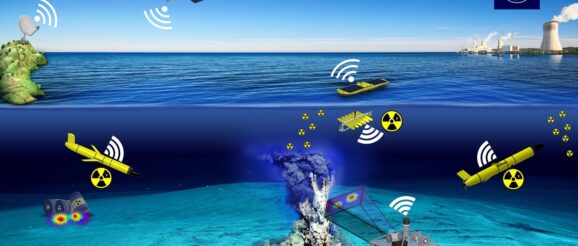RAMONES offers a breakthrough innovation for radioactivity monitoring in ocean ecosystems

RAMONES offers a breakthrough innovation for radioactivity monitoring in ocean ecosystems
RAMONES was selected among proposals submitted for FET Proactive Environmental Intelligence call (FETPROACT-EIC-08-2020), in subtopic B: Radically novel approaches to resilient, reliable and environmentally responsible in-situ monitoring, which looks for ground-breaking concepts for monitoring, analysis and management of critical resources in Europe. The RAMONES project wants to look into natural and artificial radioactivity in oceans.
The radioactivity monitoring of marine environments is relatively understudied, mainly due to a lack of truly effective and tailored instruments reflecting the specificity of subsea ecosystems. International collaborative efforts, such as the International Atomic Agency MARIS (Marine Radioactivity Information System) do exist, however, there is still a huge gap between the instruments available for intelligent, long-term, autonomous radioactivity monitoring in oceans comparing to respective measurements in land, or in air. That is what the RAMONES project wants to change.
The RAMONES team explains the project as follows: “RAMONES is an extremely ambitious, high-risk project with the aim to prove that innovative combination and advancement of recent developments in sensory materials, low-power autonomous robotic systems, and process modelling theories, have the potential to overcome current limitations and open the window to high temporal and spatial resolution underwater radioactivity measurements, in situ and in near real time, forming a game changer in deep-water environmental monitoring.”
By working on creating a new generation of submarine radiation-sensing instruments, assisted by state-of-art robotic and artificial intelligence, RAMONES will design, develop and validate a new generation of radiation-sensing instruments, providing both high efficiency and fine resolution to perform spectroscopic studies in the marine environment. Besides the innovative technology, RAMONES aims at using their data (open-access, FAIR) to suggest policies for environmental, social and financial resilience and sustainability, setting new standards for Environmental Intelligence worldwide.
As an outcome, there will be a novel, currently non-existing, generation of low-power and fast integration-time underwater instruments for in situ radioactivity measurements in extreme oceanic locations.
RAMONES is a 48-month project. It starts in January 2021 and will run until December 2024. The participants are from Greece, Portugal, Germany, France, Spain and the United Kingdom. The project is coordinated at the National and Kapodistrian University of Athens by Prof. Theo J. Mertzimekis. More information can be found at official RAMONES website.
Background information
FET-Open and FET Proactive are now part of the Enhanced European Innovation Council (EIC) Pilot (specifically the Pathfinder), the new home for deep-tech research and innovation in Horizon 2020, the EU funding programme for research and innovation.
Image © RAMONES
